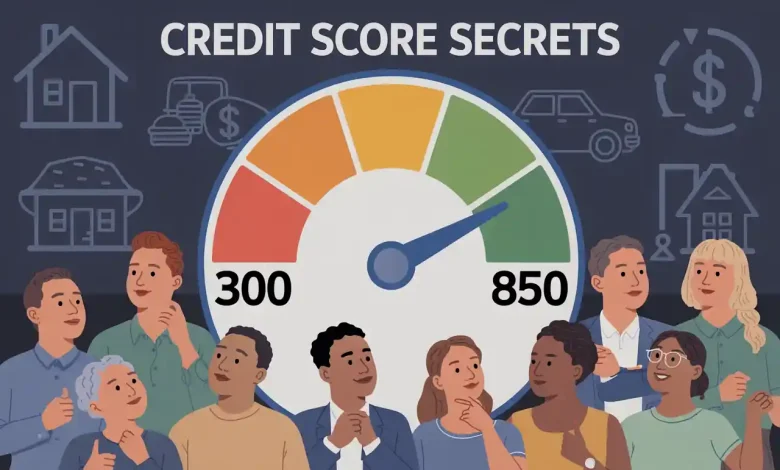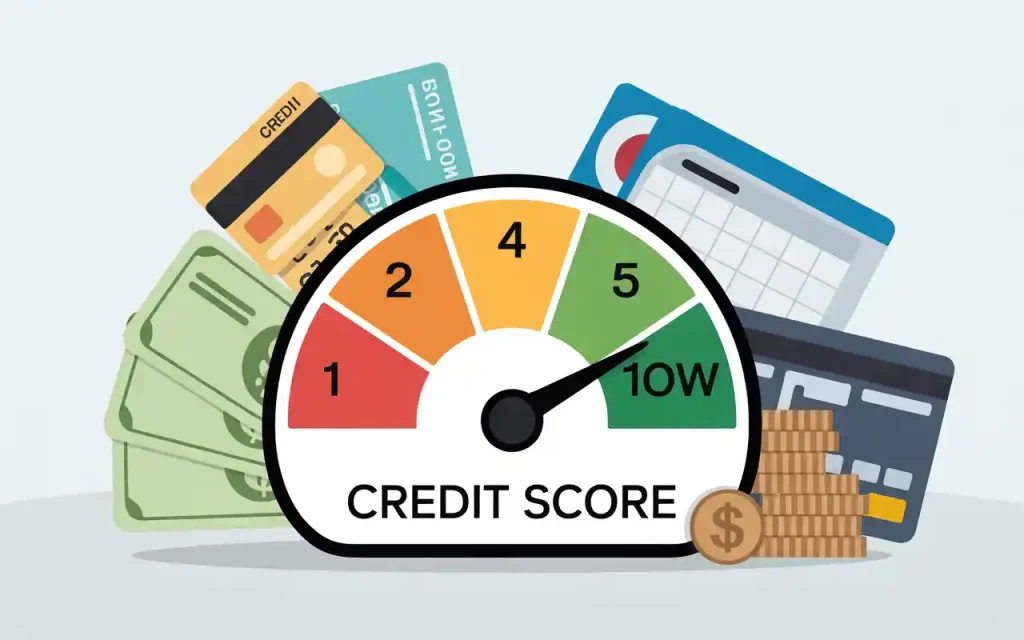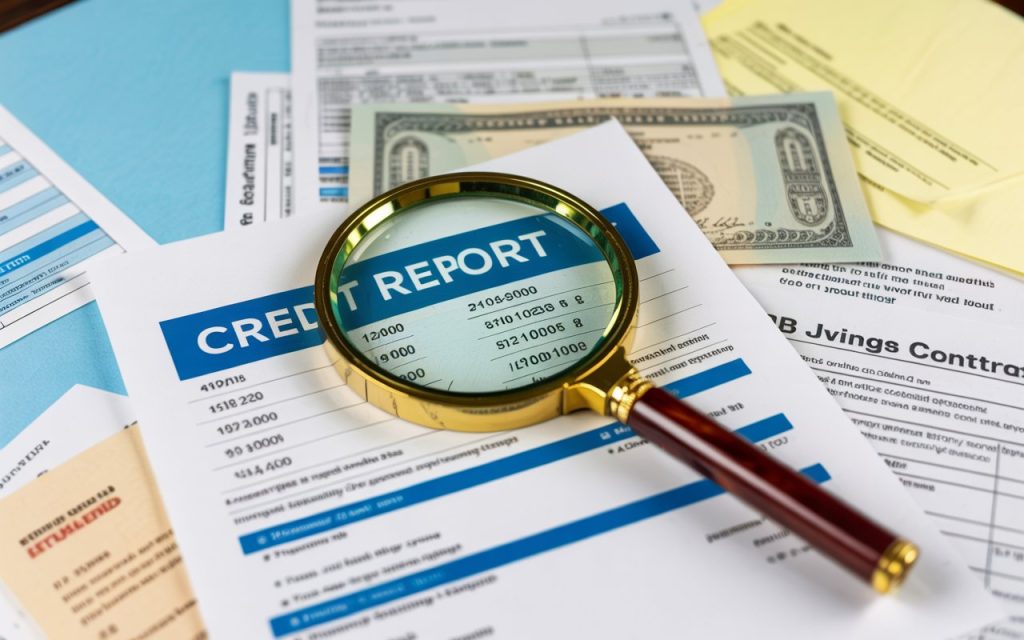Credit Score Secrets: What You Need to Know

INTRODUCTION
Credit score is a powerful number that can open or close doors in your financial life. Many people think their credit score tells the complete story about their money habits, but there are important details your score does not reveal.
In today’s world, your credit score can influence everything from getting a loan or renting an apartment to securing a job or even setting up utility services. Yet, this single number often hides more than it shows, leaving both borrowers and lenders with an incomplete picture.
Understanding what your credit score really means—and what it leaves out—is essential for anyone who wants to take control of their financial future. It’s not just about the number; it’s about the story behind it. While a high score can open doors, it does not guarantee approval if other aspects of your finances are weak.
Likewise, a lower score doesn’t always mean you’re financially irresponsible. This article will reveal the hidden truths behind credit scores, explain what lenders are really looking for, and provide actionable steps to help you build a stronger, more complete financial profile.
How Is Your Credit Score Calculated?

Your credit score is based on five main factors:
- Payment History (35 percent)
- This is the most important part. It shows if you pay your bills on time. Late or missed payments have a big negative impact.
- Even one missed payment can lower your score for months.
- Consistent on-time payments help your score grow over time.
- Amounts Owed (30 percent)
- This looks at how much of your available credit you are using. If you use too much, it can signal risk.
- Try to keep your credit card balances below 30 percent of your limit.
- High balances, even if paid on time, can lower your score.
- Length of Credit History (15 percent)
- The longer you have had credit accounts, the better. Lenders like to see a long track record.
- Old accounts help your score, so do not close your oldest cards if you do not have to.
- Credit Mix (10 percent)
- Using different types of credit, like credit cards, car loans, and mortgages, can help your score.
- Lenders want to see you can handle different kinds of debt.
- New Credit (10 percent)
- Opening several new accounts in a short time can make you look risky.
- Each time you apply for credit, a hard inquiry is made, which can lower your score slightly.
“A credit score is not just a number; it is a summary of your credit behavior over time.”
What Credit score Does Not Show

Your credit score is important, but it leaves out many details that matter to lenders and your financial life.
Income and Savings
- Your credit score does not show how much money you earn.
- It does not reveal if you have savings, investments, or emergency funds.
- Someone with a high income but poor credit habits can have a low score, while someone with a low income but good habits can have a high score.
Job Stability and Employment
- Lenders may ask about your job, but your credit score does not show if you have a steady or long-term job.
- Frequent job changes or gaps in employment are not reflected in your score.
Monthly Expenses and Obligations
- Your rent, utilities, phone bills, and other regular expenses are not included in your credit score.
- Childcare, alimony, and other personal obligations are also not counted.
Assets and Wealth
- Owning valuable assets like a home, car, or investments does not help your credit score.
- Your net worth is not part of your credit report.
Personal Details
- Age, gender, race, marital status, and where you live are never included in your credit score.
“Your credit score is just one piece of the puzzle. Lenders want to see the full picture before making decisions.”
Credit Score: Myths and Realities
| Myth | Reality |
|---|---|
| High credit score means guaranteed approval | Lenders check income, debts, and job stability too |
| Closing old credit cards helps your score | Closing old accounts can lower your score by shortening your credit history |
| Checking your own score hurts it | Checking your own score is a soft inquiry and does not affect your score |
| Credit scores are unfair | Scores only use financial data, not personal details |
More Myths Explained
- Myth: Paying off debt erases bad history.
Reality: Old late payments or collections can stay on your report for years, even if you pay them off. - Myth: All debts are equal.
Reality: Credit cards with high balances hurt your score more than installment loans like car loans.
What Lenders Really Look At in your credit score

Even with a good credit score, lenders want more information before they approve you.
Debt-to-Income Ratio
- This is the percentage of your monthly income that goes to paying debts.
- Lenders use this to see if you can afford more debt.
- A high debt-to-income ratio can mean loan denial, even with a good credit score.
Employment History
- Lenders prefer borrowers with steady jobs and long employment records.
- Gaps in employment or frequent job changes can make you look risky.
Savings and Assets
- Lenders may want to see that you have money saved for emergencies or a down payment.
- Having assets can make you a more attractive borrower.
Other Financial Obligations
- Lenders may ask about child support, alimony, or other regular payments.
- These obligations can affect your ability to repay new loans.
“A high credit score is helpful, but lenders want proof you can handle more than just credit cards.”
Why credit score It Matters for Your Life

Your credit score affects many parts of your daily life:
- Loan and Credit Card Approvals
- Higher scores make it easier to get approved for loans and credit cards.
- You may qualify for higher limits and better rewards.
- Interest Rates
- A good score means lower interest rates, saving you money over time.
- A low score can mean higher payments and more money spent on interest.
- Renting a Home
- Landlords often check your score before offering you a lease.
- A low score can mean higher deposits or being denied.
- Utility Deposits
- Some companies require a deposit if your score is low.
- A good score can help you avoid extra fees.
- Job Opportunities
- Some employers check credit reports for certain jobs, especially those involving money or sensitive information.
- Insurance Premiums
- Some insurance companies use your credit score to set your rates.
How to Improve and Protect It

Building a strong credit score takes time and good habits. Here are detailed steps to help you:
Pay All Bills On Time
- Set reminders or use automatic payments to avoid missing due dates.
- Even small bills like phone or utility payments can be sent to collections if unpaid.
Keep Credit Card Balances Low
- Try to use less than 30 percent of your available credit on each card.
- Pay off balances in full each month if possible.
- High balances can lower your score, even if you pay on time.
Do Not Close Old Accounts
- Older accounts help your score by showing a long credit history.
- Closing old cards can shorten your history and lower your score.
- If you must close an account, close newer ones first.
Limit New Applications
- Each time you apply for credit, a hard inquiry is made, which can lower your score.
- Too many applications in a short time can make you look risky.
Check Your Credit Report Regularly
- Get a free report once a year from each credit bureau.
- Look for mistakes like wrong balances, late payments, or accounts you did not open.
- Dispute errors right away to protect your score.
Diversify Your Credit
- Using a mix of credit cards, loans, and other types of credit can help your score.
- Do not take on debt you do not need just for variety.
Build Credit Slowly
- If you have no credit or bad credit, start with a secured credit card or a small loan.
- Make small purchases and pay them off to build a positive history.
What to Watch Out For in credit score

Identity Theft
- Someone using your information can ruin your score.
- Always check your reports for accounts you did not open.
- Use strong passwords and watch for suspicious activity.
Errors on Your Report
- Mistakes happen. Check your report for wrong information and dispute it quickly.
- Even small errors can lower your score.
Co-Signing Loans
- If you co-sign, you are responsible for the loan if the other person does not pay.
- Missed payments will hurt your score, even if it is not your debt.
Collections and Public Records
- Unpaid bills sent to collections can stay on your report for up to seven years.
- Bankruptcies, judgments, and tax liens have a big negative impact and stay for years.
RealLife Case Studies
Case Study 1: Malcolm’s Fast Credit Score Transformation

Background:
Malcolm had a poor credit score and was rejected when he applied for a home loan. His financial profile looked weak on paper, but he was determined to turn things around.
Actions Taken:
- Malcolm sought professional help to understand the details behind his low credit rating.
- He focused on removing negative items from his credit report, such as old defaults and errors.
- He made all his payments on time and kept his credit card balances low.
- Malcolm avoided applying for new credit to prevent additional hard inquiries.
Results:
- In just one month, Malcolm’s Equifax score jumped from 654 to 1084, Illion from 673 to 929, and Experian from 645 to 885.
- With his improved credit score, Malcolm was finally approved for his dream home loan.
Key Lesson:
A credit score can change quickly with focused effort, but lenders also look at your payment habits and financial discipline, not just your score1.
Case Study 2: Sweet Rise Bakery’s Business Recovery

Background:
The owners of Sweet Rise Bakery struggled with late payments and high credit utilization, which hurt their business credit score. This limited their access to affordable business loans.
Actions Taken:
- They obtained a detailed credit report to identify problem areas.
- Prioritized paying off debts with the highest interest rates and negotiated with creditors to remove late payment records after settling.
- Implemented a strict budget, cut unnecessary expenses, and switched to early payments for supplier discounts.
- Launched new products (gluten-free line) and weekend workshops to boost revenue.
- Applied for a business credit card with better terms and managed it carefully to build a positive history.
- Monitored their credit score monthly and adjusted their financial strategy as needed.
Results:
- Their credit score improved steadily.
- They qualified for a lower-interest loan, used it to renovate the bakery, and attracted more customers, leading to higher sales and financial stability.
Key Lesson:
A credit score doesn’t show innovation, business growth, or management skills. Lenders may require more information about business plans and cash flow, not just the score2.
Case Study 3: Elizabeth’s 90-Day Credit Comeback

Background:
Elizabeth’s low credit score led to a home loan rejection. She believed her dream of building a home was out of reach.
Actions Taken:
- Elizabeth worked with credit experts to review her credit report and identify negative factors.
- She paid off outstanding debts and made sure all payments were on time.
- Avoided opening new credit lines and focused on maintaining a clean payment record for three months.
Results:
- Within 90 days, Elizabeth’s credit score improved enough for her to qualify for a home loan.
- She started building her dream home, showing that quick credit repair is possible with the right actions.
Key Lesson:
Credit scores can improve rapidly, but lenders also want to see stable income, job history, and a responsible approach to debt—not just a number
Quotes
- “Your credit score is just one piece of the puzzle. Lenders want to see the full picture before making decisions.”
- “A credit score is not just a number; it is a summary of your credit behavior over time.”
- “Your credit score is just the tip of the iceberg. What lies beneath is often more important than the number itself.”
- “A high credit score is helpful, but lenders want proof you can handle more than just credit cards.”
- “Improving your credit score is possible, but building a strong overall financial profile is key for long-term success.”
Highlighted Points
- Credit score is a three-digit number that shows how risky or safe you are as a borrower.
- Payment history is the most important factor in your credit score.
- Your credit score does not include your income, savings, job stability, or assets.
- Lenders also look at your debt-to-income ratio, employment history, and savings, not just your score.
- Closing old credit accounts can lower your score by shortening your credit history.
- Checking your own credit score does not hurt your score.
- A high credit score does not guarantee loan approval if other financial factors are weak.
- Building a good credit score takes time, discipline, and regular monitoring.
- Identity theft and errors on your credit report can damage your score—always check your reports.
- Co-signing a loan makes you responsible for the debt if the other person does not pay.
- Negative marks like late payments or collections can stay on your credit report for up to seven years.
- A strong credit score can help you get better interest rates, higher credit limits, and more financial opportunities.
- Lenders want to see a complete financial profile, not just a good credit score.
Frequently Asked Questions

Q: Can my credit score change quickly?
A: Yes. Paying off debt or missing a payment can change your score in a month or less. New accounts or hard inquiries can also cause quick changes.
Q: Does checking my own credit hurt my score?
A: No. Only “hard” inquiries from lenders affect your score. Checking your own score is a “soft” inquiry.
Q: Can I get a loan with a low credit score?
A: Sometimes, but you may pay higher interest rates or need a co-signer. Some lenders offer loans for bad credit, but terms are usually not as good.
Q: How often should I check my credit report?
A: At least once a year, or before applying for a big loan. Checking more often can help you spot fraud or mistakes early.
Q: How long do negative marks stay on my credit report?
A: Most negative marks, like late payments or collections, stay for seven years. Bankruptcies can stay for up to ten years.
CONCLUSION
Your credit score is a powerful tool, but it does not tell your whole financial story. Lenders look at your income, job, debts, and more before making decisions. By understanding what your credit score hides and taking steps to improve your full financial picture, you can unlock better opportunities and protect your future. Always stay informed, check your reports, and make smart choices to keep your financial life strong and healthy




